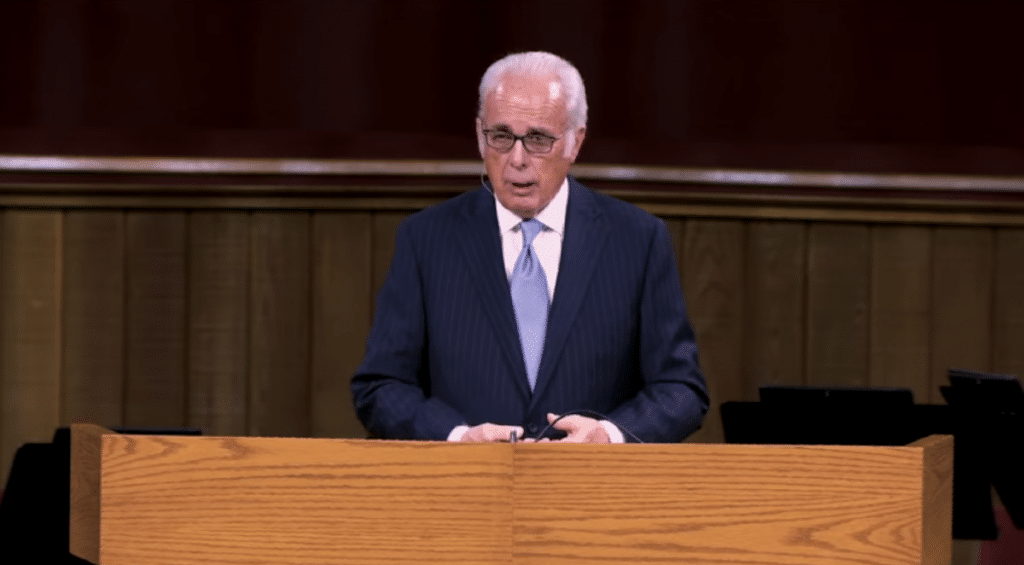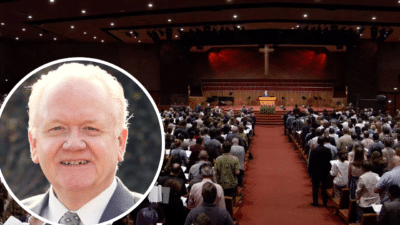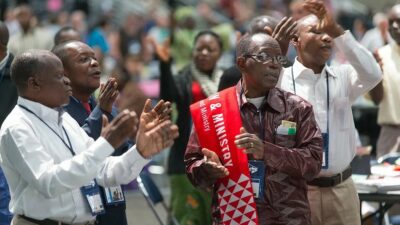Who owns the rights to John MacArthur’s sermons? And is it okay for MacArthur to be profiting from them?
Recently, Phil Johnson, executive director of Grace to You, revealed in a letter that MacArthur’s sermons “are not works for hire” and MacArthur’s messages “are not considered the church’s intellectual property.” Johnson linked to the letter in the following tweet:
Who owns the rights to a pastor’s sermons?
Here’s our position and the reasons for it:https://t.co/ooOzquyFoG
(Answering an email query that came to me this morning.)
— Phil Johnson (@Phil_Johnson_) March 24, 2021
The issue is relevant because, as Johnson revealed in a video in February, MacArthur makes “millions” on book royalties—and some of MacArthur’s books are essentially MacArthur’s repackaged sermons.
If the church owns MacArthur’s sermons, or “intellectual property,” then the church would have claim to those royalties. However, as Johnson’s recent statement makes clear, both Grace Community Church and MacArthur consider MacArthur’s sermons to be MacArthur’s property, so the royalties go to him.
Yet Johnson’s claim directly contradicts two lawyers I quoted in an article last month.
Your tax-deductible gift helps our journalists report the truth and hold Christian leaders and organizations accountable. Give a gift of $30 or more to The Roys Report this month, and you will receive a copy of “Hurt and Healed by the Church” by Ryan George. To donate, click here.
One of them is Michelle Adams, a nonprofit attorney in Boise, Idaho, specializing in Christian ministries and churches. According to Adams, if someone works for a nonprofit, the works the employee produces on the job belong to the nonprofit.
Also quoted in my article was Frank Sommerville, who told Christianity Today that “if a sermon qualifies as work for hire, the intellectual rights for that sermon belong to the church.” Sommerville added that intellectual property rights are considered “charitable assets” and by law, must be used for “charitable purposes” not “private inurement.”
Yet Johnson claims these attorneys are wrong and appeals instead to the attorney engaged by Grace Community Church—Sealy Yates.
Yates is well-known among Christian celebrities and was the literary agent for former Mars Hill pastor, Mark Driscoll, and popular, radio pastor David Jeremiah, when both were involved in book selling scandals. The scandals involved employing a company called ResultSource, which bought bulk orders of the authors’ books, catapulting them to the NY Times best-seller list.
Yates also was the lawyer who was able to negotiate a deal between Chuck Swindoll and his church, giving Swindoll all intellectual rights to his sermons.
So who is correct? Johnson and Yates or Adams and Sommerville?
I reached out to Michelle Adams, who supplied written responses to Johnson’s claims. Below is both the text of Johnson’s letter, as well as Adams’ responses. (Johnson redacted several names from the initial letter in the version he posted online.)
Letter by Phil Johnson with responses by Attorney Michelle Adams:
Phil Johnson:
Dear _________
I think this issue was recently raised and given quite a bit of publicity by Julie Roys, who clearly has a personal agenda to try to discredit John MacArthur. Evidently, Mr. _________ has picked up on the theme and hopes to get some mileage out of it.
Unfortunately, Mr. _________ hasn’t a clue what he is talking about. The elders of Grace Community Church considered and settled this issue in the early 1980s. The policy they formally ratified then has remained unchanged ever since. Our pastors’ sermons are not works for hire, and their messages are not considered the church’s intellectual property.
Michelle Adams:
This phraseology implies that the church has the ability to determine whether sermons are considered works-for-hire under the law, which is incorrect. Even the article which Mr. Johnson cites below makes the following statement: “It should be noted that under neither the 1909 Act nor the 1976 Act can an agreement between employer and employee determine whether a work is a work made for hire within the terms of the statute.”
Johnson:
A pastor’s sermons are the equivalent of a college professor’s lectures and study notes. Since the 1976 Copyright Law went into effect, several courts have ruled emphatically that a university professor’s research, classroom content, and notes are his own intellectual property. (See: https://digitalcommons.law.villanova.edu/cgi/viewcontent.cgi?article=2776&context=vlr.) If a professor transfers to a new university, the material still belongs to him, and if it becomes the basis of a book he publishes, the university that employs him has no rightful claim on a share of the royalties. (Note: “There is a thin but assertive line of judicial decisions recognizing a ‘professor’s exception’ to the work-for-hire doctrine.” Source: https://www.mediainstitute.org/201 0104/29/academic-freedom-copyright-and-work-for-hire/.)
Adams:
“Thin but assertive line” is right. There is a narrow exception in the world of academia. It has been litigated and clarified. However, pastors do not enjoy this litigated exception. There are certainly parallels which could be argued (and perhaps that is the game plan of the church – to be ready to argue for a novel exception), but it’s not current law. At the very least, it ought not be implied that the IP question is invalid.
Johnson:
Also, virtually every pastor I know uses his personal time in evenings or on days off to do at least part of his study, reading, reflection, and preparation. Pastors are not hourly employees, writing sermon notes “for hire.”
Adams:
Creating IP “on your own time” would be an argument for a pastor who writes books (that are not just a reprint of a sermon) as a separate endeavor. The Copyright Act does not attempt to define “for-hire” work as that which is produced by hourly wages as opposed to a salaried position, but rather whether the work is within the scope of what the employee was hired to do under the control of that employer. If one were to ask ten people what they would consider to be the main job description of a pastor, ten out of ten will inevitably mention Sunday sermon-making.
Furthermore, the platform of the sermon pulpit is a resource owned by the church. The use of a nonprofit’s assets to accrete value and recognition for an individual’s privately owned intellectual property can be problematic when it results in personal financial gain. It goes against well-established pillars of tax-exempt law, namely private benefit (and in the case of an influential leader, potential private inurement as well). While it could naturally be argued that there is a religious purpose being served through giving a platform to the sermons (and therefore a public benefit is served), this lays alongside the fact that a private benefit is also being served. By law, tax-exempt entities may have no more than an insubstantial nonexempt purpose being served by their activities or they imperil their exemption. (This is why a Christian bookseller is not a tax-exempt entity even though they sell educational/religious books. This exemption is disallowed because of the private benefit rendered to authors as well as the sellers.)
Johnson:
However, because this is a frequently-contested issue, in 1984, Grace church engaged an attorney, Mr. Sealy Yates, to investigate and advise the church on this very question. (Mr. Yates is an expert in copyright and publishing law. http://yates2.com/.) He gave the elders a 12-page opinion detailing why a pastor’s sermons should not be regarded as works for hire. The elders formally affirmed his opinion at the time, and by written agreement, this has been on record as a matter of church policy ever since.
Adams:
The 12-page opinion would be of interest. But again, I suspect that any opinion that required 12 pages to craft is more likely to be an argument of analogy, rather than one of settled law. The church may feel they are on solid footing to defend the decision and has therefore continued in the position.
Johnson:
The actual law in question, the 1976 Copyright Act [Section 201 (b)} states that “in the case of a work made for hire, the employer or other person for whom the work was prepared is considered the author … unless the parties have expressly agreed otherwise in a written instrument signed by them.” So this is not a matter for legal debate. Our church’s policy has been clear and well documented for decades.
Adams:
As stated above, the church does not have the authority to declare whether something is a work-for-hire. If the church declared the IP not work-for-hire, then it would seem to follow that they would not have a written agreement transferring the IP to the executives (which makes the above statement confusing). But if, despite the position that the IP is not a work-for-hire, the church does indeed have a signed writing that transfers the IP to the executives, then it raises a separate question of valuation, as discussed below.
Johnson:
Furthermore, because the question resurfaces every 10-15 years, the elders of GCC reaffirmed the same policy in 1998. About a decade into the new millennium, we discussed the issue again and reaffirmed once more what has always been recognized by the church’s leadership: Namely, that teaching notes and messages prepared by pastors at Grace Community Church remain the intellectual property of their authors, and sermons preached in our church or works written for publication by our staff are not to be regarded as works done for hire, unless a specific topic is assigned and the work is specifically contracted as a work for hire in a signed agreement with the pastor or staff member who writes the material.
Adams:
Not addressed in this email but brushed against in this paragraph is the issue of an entity – (Grace to You) – which appears to be solely dedicated to the marketing of a private individual’s personal IP assets. As mentioned above, just because there is a religious/educational purpose involved does not eliminate the problematic presence of a significant nonexempt purpose serving a private benefit (for an indisputable insider, no less).
Johnson:
Christianity Today magazine helped muddy this issue a few years ago with an article arguing that sermons ought to be viewed as works for hire. But no church that really cares about their pastor would ever enforce such a ridiculous scheme. It would mean that if the pastor prepares a sermon for preaching to his church, he could never use that sermon again without the express, formal permission of the church. If he should leave and go to another church, the original church would still own all the material he prepared while he was their pastor, and he could never preach to church #2 from the passages of Scripture he covered while he was at church #1, unless he contracted for permission from church #1 to use that material again, or unless he generated completely new sermons on those biblical texts, with none of the same ideas or wording he used at church #1. That’s an insane proposal, and literally no one faithfully practices or enforces such a policy.
Adams:
Of course, an argument based upon desirable outcome is not part of a legal analysis. To get around the issues raised above, however, some churches license their pastors the permission to reuse the copyrighted materials. More of them, however, likely do not enforce their rights against the pastors for the reasons Mr. Johnson mentioned above. But also, in most cases the value of the IP is de minimus and not worth the effort by the church to even monitor the usage. In the case at hand, however, the value of the IP in question is significant.
Johnson:
If a pastor who uses the content of his sermons to write books wishes to donate royalties from his writing ministry to the church, that is of course perfectly appropriate-but it is entirely his business, and no principle of ethics or propriety requires him to make those donations public in order to satisfy the muckrakers, scandalmongers, and self-appointed legal experts who troll the Internet trying to sully the reputations of faithful men.
For the record, John MacArthur does all his own study in preparation for his sermons. He does not employ a “research assistant” or ghostwriter to generate sermons. Editors do help in the preparation of that material for print publications. (I’m one of those editors, and Pastor MacArthur regularly and generously gives credit for the work his editors do.) There is nothing unusual or unethical in that process.
Mr. _________ ‘s claim “that it is legally not correct … to publish sermons that belong to the church” would have some teeth if it were true that sermons are the church’s intellectual property. Since that is not the case, his whole argument is bogus.
Thanks for asking. It’s what someone ought to have done before raising unnecessary questions about John MacArthur’s integrity on the internet.
Adams:
This email only addresses the legal question of whether sermons are considered “works-for-hire” but not the question raised by virtue of the fact that the church is a tax-exempt entity. Even if it were entirely permissible to transfer ownership of the copyright in the IP to the executive, it must be determined whether that executive’s total compensation would be considered reasonable with its inclusion. Intellectual property has a value (as difficult as it may sometimes be to ascertain). When that value is added to the salary of the executive, the total must be “reasonable” (based upon a variety of factors). If the IRS considers the total to be “unreasonable” then there may be an issue of “excess benefit” to that executive, which can lead to monetary penalties as well as concerns about the tax exemption of the church.




















62 Responses
Though I personally do not like Phil Johnson (or MacArthur), as a writer and teacher for many years myself, I agree that M. Adams is beating her point to death and not seeing the common sense of what Phil proffers here. Who did all C.H. Spurgeon’s sermons belong to? His estate, I imagine, and his wife had them published, like so many other great religious minds of the past. With all the worst things going on in the church today, this topic is “vain jangling” and should be left to each individual congregation to agree on what makes sense, regardless of what dusty man-made laws might imply. Did the church at Corinth own Paul’s sermons?
if the church doesn’t own the sermons then Macarthur owns the church.
I think a Pastor should receive a fair salary and any royalties from sermons should belong to the Lord therefore any money made from sermons should go back into the Lords work after all Pastors claim these sermons are given to them by the Lord in the first place.Right?
With regard to Johnny Mac do you think it’s possible his books and sermons are put together by other people e.g (secretary’s or ghost writers) if so maybe they should own the sermons and receive the royalties not J M?
Or maybe if there are such people they are already on a percentage? Who knows?
I’m sure if there were any such people they would get really mad if someone was to pry into such things and possibly put their massive salaries in danger.. I guess we ought to be wary and look out for those who exhibit great anger then? Sometimes there is none more angry than a proud guilty man on the brink of being exposed?